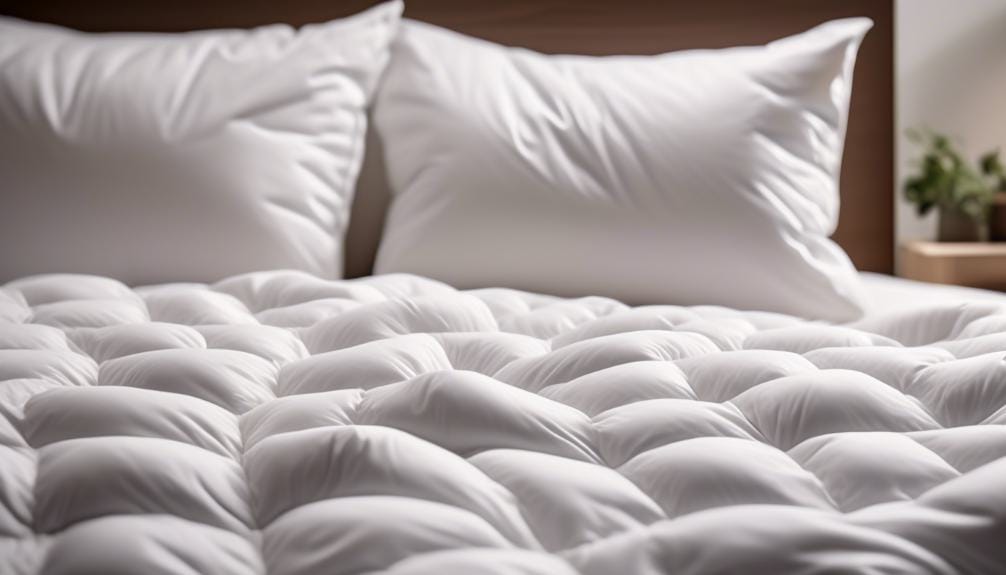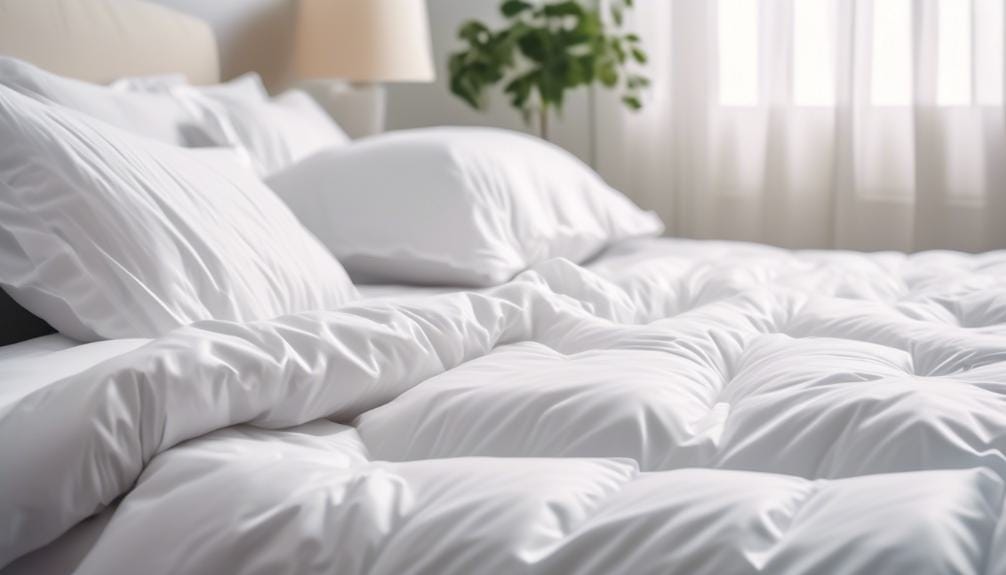What Duvet Is Best for Allergies? Allergy-Friendly Bedding
If you’re in search of the perfect duvet to help manage your allergies, you’ve likely encountered the overwhelming array of options available. Finding the right bedding can make a significant difference in your sleep quality and overall well-being.
With various materials, fillings, and technologies claiming to be allergy-friendly, it can be challenging to navigate the choices. But fear not, as we’ll guide you through the essential considerations and recommend some top-rated allergy-friendly duvets that are sure to offer you a peaceful and comfortable night’s sleep.
Key Takeaways
- Hypoallergenic duvets made from natural materials like bamboo, silk, or wool can reduce allergy symptoms.
- Synthetic-fill duvets are hypoallergenic and resistant to dust mites.
- Proper maintenance and washing of duvets can help prevent allergen buildup.
- AiryWeight Eucalyptus Comforter and Duvet Covers are recommended for allergy sufferers due to their hypoallergenic and dust mite-resistant properties.
Understanding Allergies and Bedding

If you suffer from allergies, understanding how bedding can impact your symptoms is crucial for creating a comfortable and allergen-free sleep environment. Allergies can be triggered by dust mites, pet dander, pollen, and mold, which can accumulate in your duvet and affect your sleep quality.
Choosing a hypoallergenic duvet made from natural materials like bamboo, silk, or wool can help reduce allergy symptoms and provide a comfortable sleeping environment. These materials are resistant to dust mites and mold, creating a barrier against allergens. Additionally, hypoallergenic duvets are often moisture-wicking, preventing the buildup of mold and mildew.
Factors to Consider When Choosing Allergy-Friendly Duvets

When selecting allergy-friendly duvets, it’s essential to consider various factors that can directly impact your comfort and allergy management, building on the understanding of how bedding can affect your symptoms.
Here are some key factors to consider:
- Opt for duvets made from eucalyptus fibers, which are soft, breathable, and hypoallergenic, making them ideal for allergy sufferers.
- Look for duvets with moisture-wicking properties to keep you cool and dry throughout the night, ideal for allergy sufferers with sensitivities to heat and moisture.
- Choose lightweight yet warm duvets suitable for all seasons, ensuring comfort while minimizing the risk of allergen buildup.
Considering these factors, along with features such as hidden zipper closures and machine washable, wrinkle-resistant duvet covers, will help you in managing allergies effectively.
Synthetic Vs. Natural-Fill Duvets for Allergies

Choosing between synthetic and natural-fill duvets is a crucial decision for allergy sufferers, as it directly impacts their comfort and allergy management.
Synthetic-fill duvets are often hypoallergenic and resistant to allergy triggers such as dust mites, making them a suitable choice for those with allergies.
On the other hand, natural-fill duvets like wool, silk, and bamboo are naturally resistant to dust mites and allergens, making them ideal for allergy prevention.
Allergy sufferers should also consider using allergen-proof duvet covers to provide an additional layer of protection against dust mites and allergens.
Proper maintenance and washing of duvets, along with the use of hypoallergenic eucalyptus duvet covers, can further help prevent allergen buildup and improve sleep quality for allergy sufferers.
Best Practices for Maintaining Allergy-Friendly Bedding

To maintain allergy-friendly bedding, regularly washing the comforter according to the manufacturer’s instructions is crucial to prevent allergen buildup. Use a gentle, hypoallergenic detergent to avoid irritation when washing the comforter.
Dry the comforter thoroughly to prevent mold and mildew growth. Use a duvet cover to protect the comforter from allergens and stains.
Vacuum the sleeping area regularly to reduce allergen buildup and maintain an allergy-friendly environment.
Recommended Duvets for Allergy Sufferers

For allergy sufferers, finding the right duvet can significantly improve sleep quality and minimize allergen exposure.
The AiryWeight Eucalyptus Comforter and Duvet Covers are an excellent choice. Made from eucalyptus fibers, they provide a soft, breathable, and luxurious sleep experience. The hypoallergenic and dust mite-resistant properties make them ideal for allergy sufferers.
These covers have moisture-wicking properties, keeping you cool and dry throughout the night, suitable for all seasons. Additionally, they’re lightweight, yet warm, and come in multiple colors and sizes to fit any bedroom decor.
Positive customer reviews highlight improved sleep quality and praise the durability and eco-friendly aspects of AiryWeight products.
When it comes to recommended duvets for allergy sufferers, these covers stand out for their allergy-friendly features and comfort.
Frequently Asked Questions
What Is the Best Material for a Duvet Cover for Allergies?
For allergies, eucalyptus duvet covers are the best choice. They’re hypoallergenic, resistant to dust mites, and have moisture-wicking properties that keep you cool and dry. Plus, they’re eco-friendly and add a smooth, silky comfort.
Which Duvet Is Best for Allergies?
For allergies, opt for a hypoallergenic, tightly woven, and antimicrobial duvet made of eucalyptus. Look for reputable allergy certifications and breathable materials for a comfortable and allergy-friendly sleep experience.
What Is the Best Material for Anti Allergy Bedding?
For anti-allergy bedding, prioritize hypoallergenic materials like eucalyptus, organic cotton, or wool. These options resist dust mites and are gentle on sensitive skin. Look for moisture-wicking properties and breathability to keep you comfortable all night.
What Duvet Material Is Hypoallergenic?
For hypoallergenic duvet material, eucalyptus is a great choice. It’s resistant to dust mites and moisture-wicking, keeping you cool and dry. Eucalyptus duvet covers are lightweight, warm, and easy to maintain, making them ideal for allergy sufferers.
Conclusion
In conclusion, when it comes to choosing the best duvet for allergies, opt for allergy-friendly bedding made from eucalyptus fibers, such as the AiryWeight Eucalyptus Comforter and Duvet Covers.
These duvets are hypoallergenic, resistant to dust mites, and have moisture-wicking properties to keep you cool and dry throughout the night.
With their lightweight yet warm design, eco-friendly production process, and smooth, silky texture, they’re the perfect choice for allergy sufferers.
